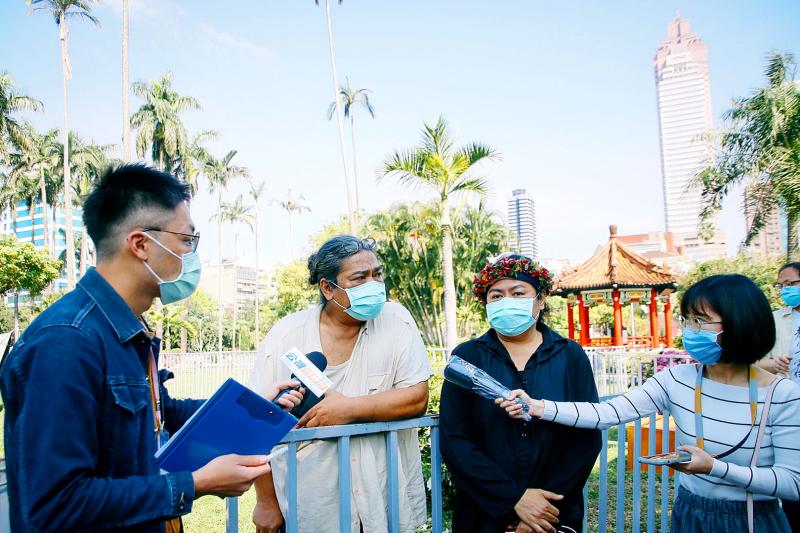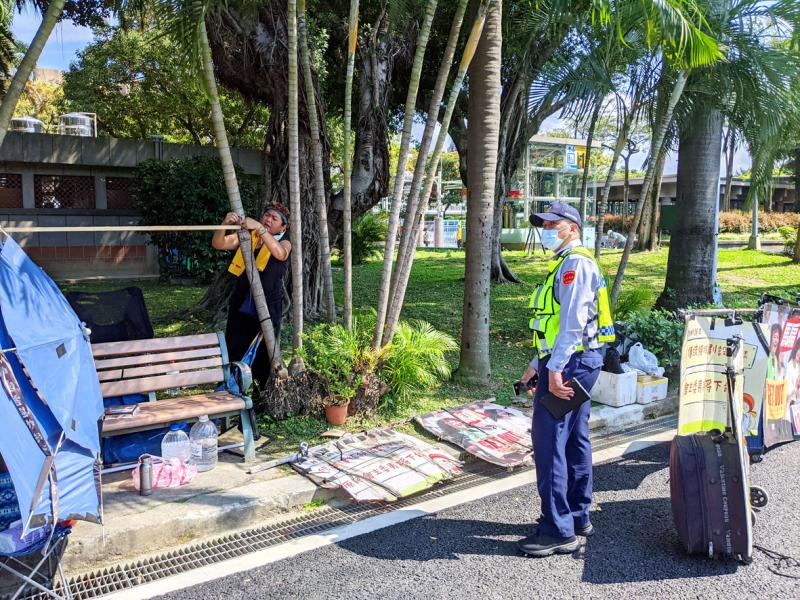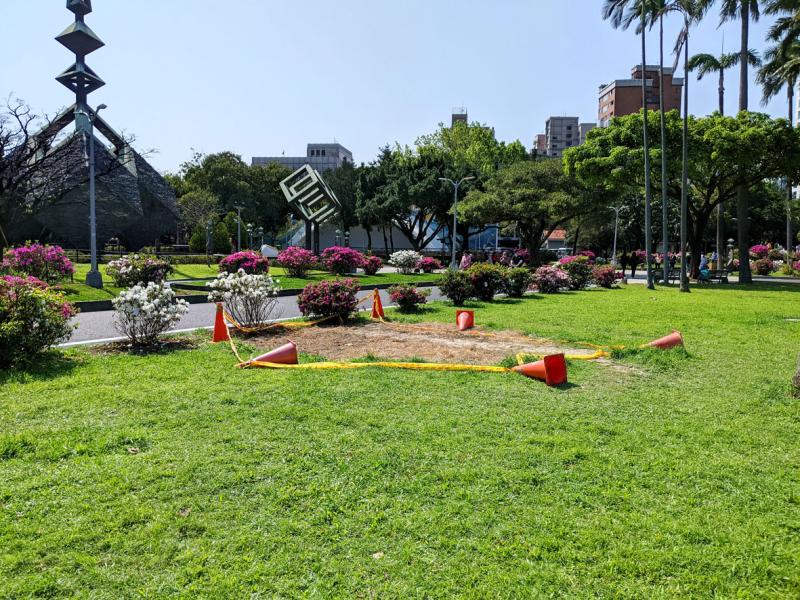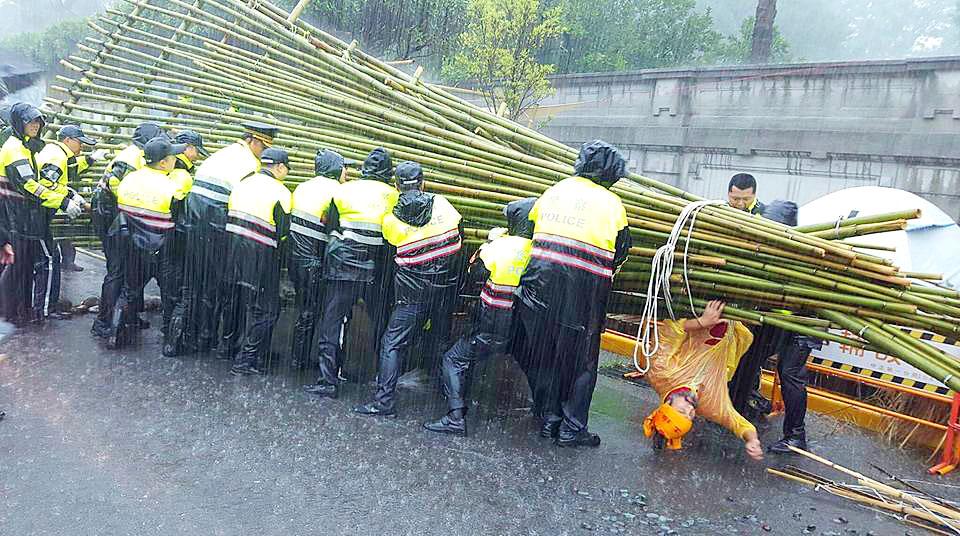Indigenous Puyuma singer and activist Panai stares solemnly at a spot of dry, beige grass where her home in Taipei’s 228 Memorial Park used to be.
On March 13, the Taipei City police announced they would tear down her encampment after almost two years of legal battles, in which the Taipei High Administrative Court ruled that Panai did not have the right to camp in the park as a form of protest. The task was completed the next day.
Panai, as well as her Bunun artist and activist husband Nabu, spent the next few nights sleeping on park benches. Since February 2017, the couple have been protesting President Tsai Ing-wen’s (蔡英文) land policy reforms for indigenous communities, which they say have not been carried out.

Photo courtesy of the Taiwan Association for Human Rights
Their protest shows that even with a government that says it supports their cause, their struggle for transitional justice — and those of indigenous communities in general — is far from over.
ROOTED IN THE LAND
On Aug. 1, 2016, President Tsai apologized to Taiwan’s indigenous peoples, promising to “begin to delineate and announce indigenous traditional territories and lands,” as a step towards realizing, “the ideals of indigenous self-government.”

Photo: Itamar Waksman
Panai and Nabu decided to pitch their tents in central Taipei that same day, protesting what they say is the theater of the president’s apology and her lack of respect for indigenous customs.
Tsai visited the couple two days later to ask for more time in implementing her promises. They believed her and returned home that same day.
Panai and Nabu have been activists for over three decades. Some of their first activism was participating in the “return our land” (還我土地) movement of the 1990’s, which centered the expropriation of indigenous land over Taiwan’s 400 years of colonization in the modern struggle for indigenous rights.

Photo: Itamar Waksman
But for Nabu, a decisive change came in 2001, when the government allowed him and other members of the Husongan community (霍松安家族) to visit their ancestral lands in the mountains of Taitung County, land from which the Japanese expelled them in 1942.
The process of gaining permission to eventually begin rebuilding his community’s home in 2006, and the reconstruction of the site since then, led Nabu to realize that without “remapping the land, and establishing a connection with it, it’s as if [we] never existed there.”
As promised, on Feb. 14, 2017, the Council of Indigenous Peoples promulgated the Traditional Territory Designation Procedure (傳統領域範圍劃設辦法), creating a process for mapping land and the authority to declare traditional indigenous territories.

Photo courtesy of the No One is an Outsider
A preliminary survey by the council found that around 50 percent of Taiwan’s land could be categorized as indigenous territories.
With the Indigenous Basic Law (原住民族基本法) guaranteeing indigenous people the right to informed consent over economic activities on their traditional lands, their demarcation could create a massive change in Taiwanese society.
TRANSITIONAL JUSTICE
But after the procedure’s announcement, many like Panai and Nabu were left unsatisfied because the council excluded private property from traditional territories.
“Our rights are to be exercised on land that has been defined as ours. Because of [the exclusion of private land], our supposed right to informed consent [turns out to be] a very small right,” she said as her voice broke off, sounding exasperated.
Panai added that with already so few rights, the exclusion of private land from traditional territories further limited the power of indigenous people.
Panai and Nabu decided that the procedures were unacceptable. A week after the procedure was announced, they, alongside their friend, director Mayaw Biho, pitched their tents in front of the Presidential Office Building on Ketagalen Boulevard.
They were soon joined by student organizations, both indigenous and Han Taiwanese, who pitched their tents in support. At that moment, a multifaceted protest movement that incorporated art and education with the central demand of land justice was born.
“We wanted real transitional justice,” said Panai, who continued to create music, releasing an EP, Ears of Rice on Ketagalan Boulevard, two months into the protest.
The most difficult moment came on the one hundredth day of the protest, when over 200 police officers came on a tempestuous winter day to forcibly evict the protesters.
Their tents forcibly torn down and possessions soaked, Panai and Nabu relocated to the park, where they remained until police removed them, waiting for President Tsai to answer their demands.
The Office of the President declined to comment for this article, directing the Taipei Times to the Council of Indigenous Peoples. The council did not respond to a request for comment.
‘HISTORIC HOMELANDS’
While the struggle over indigenous traditional territories can be traced back to the “return our land” movement, according to Lin Yi-jen (林益仁), a professor at National Taipei Medical University, it was during the presidency of Chen Shui-bian (陳水扁) that the term “traditional territories” (傳統領域) began to appear.
When Chen campaigned for the presidency, he promised a new partnership with indigenous groups. After he became president in 2000, the council began conducting land surveys to decide what groups had lived where before the nation’s colonization.
“Historic homelands are extremely important to each indigenous group’s identity. Without them, it’s very difficult for each group to define what kind of people they are,” Lin said.
However, the process of mapping traditional territories was continuously marred by problems, and by 2007 it had stalled. Tsai’s 2016 apology brought new life to this decades-long struggle.
The 2017 procedures by the council failed to define traditional lands. In June 2018, it declared the traditional territory of the Thao people (邵族) in Yuchi Township, Nantou County. However, the local government and land holders appealed the move, claiming that it was absurd to subject the township’s 15,000 residents to the whims of the 300 Thao living there.
The Executive Yuan accepted their appeal and rescinded the council’s declaration. Since then, no other traditional territories have been declared.
Panai and Nabu plan to stay in the park until President Tsai leaves office, doubting she will come to discuss their demands. After she steps down, they plan on returning to their communities to continue fostering the connection between them and the land.
The couple see their protest, and the wider struggle for traditional territories, as a fight to advance Taiwan’s democracy.
“Democratic systems are not enough to overcome the legal exploitation of peoples and resources for the sake of economic growth,” Nabu said.

When the South Vietnamese capital of Saigon fell to the North Vietnamese forces 50 years ago this week, it prompted a mass exodus of some 2 million people — hundreds of thousands fleeing perilously on small boats across open water to escape the communist regime. Many ultimately settled in Southern California’s Orange County in an area now known as “Little Saigon,” not far from Marine Corps Base Camp Pendleton, where the first refugees were airlifted upon reaching the US. The diaspora now also has significant populations in Virginia, Texas and Washington state, as well as in countries including France and Australia.

On April 17, Chinese Nationalist Party (KMT) Chairman Eric Chu (朱立倫) launched a bold campaign to revive and revitalize the KMT base by calling for an impromptu rally at the Taipei prosecutor’s offices to protest recent arrests of KMT recall campaigners over allegations of forgery and fraud involving signatures of dead voters. The protest had no time to apply for permits and was illegal, but that played into the sense of opposition grievance at alleged weaponization of the judiciary by the Democratic Progressive Party (DPP) to “annihilate” the opposition parties. Blamed for faltering recall campaigns and faced with a KMT chair

Article 2 of the Additional Articles of the Constitution of the Republic of China (中華民國憲法增修條文) stipulates that upon a vote of no confidence in the premier, the president can dissolve the legislature within 10 days. If the legislature is dissolved, a new legislative election must be held within 60 days, and the legislators’ terms will then be reckoned from that election. Two weeks ago Taipei Mayor Chiang Wan-an (蔣萬安) of the Chinese Nationalist Party (KMT) proposed that the legislature hold a vote of no confidence in the premier and dare the president to dissolve the legislature. The legislature is currently controlled

As we live longer, our risk of cognitive impairment is increasing. How can we delay the onset of symptoms? Do we have to give up every indulgence or can small changes make a difference? We asked neurologists for tips on how to keep our brains healthy for life. TAKE CARE OF YOUR HEALTH “All of the sensible things that apply to bodily health apply to brain health,” says Suzanne O’Sullivan, a consultant in neurology at the National Hospital for Neurology and Neurosurgery in London, and the author of The Age of Diagnosis. “When you’re 20, you can get away with absolute